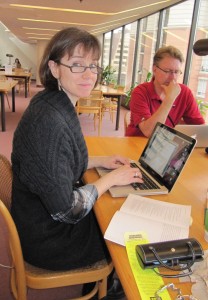Back before I started my first novel, I asked my full-time writer friends how they did it, how they sat down at their desks every day without that feeling of dread, that feeling that their desk was repelling them like a magnet. None were very helpful, I must say. I got some blank stares, maybe a few, “Y…es, I remember that it was like that once…” but no definite answers as to how to combat that particular form of writer’s block that sometimes affects new writers: the inability to get started and keep the momentum going.
When I was a young student just beginning to tell people (in a reticent murmur without looking them in the eye) that I might want to be a novelist someday, someone gave me a classic book on writing that said something like: “A writer writes every day. If you’re not the kind of person who can do that, quit now.” Ouch! I can’t tell you what book it was—I have wisely thrown it away—but it was perhaps the most unhelpful present I have ever received. Sure there are good arguments for writing regularly, but writers aren’t always born with this ability. Sometimes it takes years to develop good writing habits.

My friends Rob and Ruth and I can often be found at the Toronto Reference Library on Thursdays, keeping the momentum going.
The thing that finally got me over the hump and on the right road was having a writing partner. Mine was called Aino. I would trek to Aino’s house every Thursday to write for three or four hours. Sometimes we’d read what we’d written. Aino’s rough drafts were far better than mine, and her output was about double, but her good company and the commitment we had made together kept me coming back.
Once I had it in my mind that, whatever else happened during the week, I was going to be writing on Thursday, I somehow found that I could do a little more. Someone suggested writing just 15 minutes every day before work, and I found I could do it now. Momentum in writing is a miraculous thing. Once I finally started to gain some, I was amazed by how many story problems my subconscious would unravel for me between writing sessions. I learned that writing regularly is simply more productive for me than writing in agonized bursts, and once I really knew that, it was hard to go back.
This year, when my friends Rob and Ruth asked if I wanted to write with them (every Thursday, as it happened) I knew it wasn’t something I really needed anymore, but I said yes anyway. I’m glad I did. For me it serves another purpose now; it breaks up the monotony of my writing week. Plus, it’s great to see that Rob isn’t quite so repelled by his desk anymore.
Occasionally, “the dread” will rear its head again (usually about the time when I start bragging to myself that I’m over it) but it has never been quite so bad as when I started out. If you’re feeling it, a writing partner might be for you.




 Hi! I'm Lena, a young adult fantasy author from Toronto.
Hi! I'm Lena, a young adult fantasy author from Toronto.
I threw that write everyday advice away too! Just not possible for most of us. Didn’t have a writing partner, but did write my first YA novel in chapters to read to my writing group – one every month. That kept me writing, and I dedicated Getting a Life to them.
Thank goodness for writing groups. Mine really keeps me going too–a different bunch from my writing “partners.” (It takes a village to get Lena to write a novel.)
Good topic, Lena. I find that writing regularly is much easier than gearing myself up to write in big chunks. When “the dread” creeps in, I tell myself to write only 200 words. With such a small number, I can sometimes trick myself into writing more.
I know there are some people who have to write in big chunks for time/family reasons but it’s really not the best way for me. And yes! Just telling myself to do something small, like 200 words, can definitely trick me into writing.
Hi, Lena,
I’ve had the same thoughts! Somedays, the only thing I write it the grocery list. Does that count? But seriously, I agree that trying to be consistent works better for me than locking myself in the writing cave for hours at a time.
Hi Urve. Still processing that Screen-writing conference we went to. Thanks for stopping by! (And no, I’m not sure the grocery list counts–unless you can find a way to work it into your novel, which might be an interesting writing exercise.)
My first ever blog mention! But I must credit Lena with suggesting the writing partner scheme. It has been a great help to me and it’s good fun to talk about the process over lunch after each session.
I will take any credit you want to give me, Rob. 🙂
Is that actually a picture of Rob working? Wow!!!
Great article, Lena. It’s so true, that momentum builds when you start writing steadily, even a little bit. And (sadly) it un-builds pretty quickly, too. Blech. 😉 When I have trouble getting going again, I make myself write for just 25 minutes, or just 500 words, or something that sounds un-threatening, to trick myself into getting started. It helps.
Yes, Erin, it’s Rob working! (Or possibly downloading a new Mac ap, but if so it’s a WRITING ap.)
I really like the idea that’s coming up of setting a really short word count. Hadley Dyer once suggested to me setting a timer for 20 minutes or so and doing nothing but writing until it goes off.
Writing ABOUT the snag in a novel (or any aspect of it that you’re having trouble figuring out how to approach), instead of actually trying to solve it, is another way to disssolve that “dread” of the desk that can be so unnecessarily crippling.
Ooh. Writing about the sang–I forgot about that one. I might just have to do that tomorrow, in fact. Very apropos, Kathy! Thank you.
Hi Lena,
I have often encountered resistance in my work (in both writing and illustrating) and wondered why. Then I read The War of Art by Steven Pressfield which shed a lot of light on the subject. There’s a foreword by Robert McKee and Steven shares his prayer to the Muse which inspired me to write my own. It was great to realize I wasn’t alone. And your blog post makes me feel like that as well. Thanks for sharing!
The kitchen timer works well for me as well. Somebody should write a book called 100 Ways to Trick the Mind into Getting Started.
Oh Barbara, thank you for writing. It really is amazing for me to hear that other writers feel this resistance too. I haven’t heard of The War of Art, but I really like the idea of writing a prayer to the muse. I definitely going to have to look for that one.
Hi Lena: Great post! What I realized about me and my output is that I need the subway. Yep. As soon as hockey season ended and I didn’t have to drive to work (so I could race out of here and drive The Boy to an arena) I was on the subway every morning for 30 minutes and every night for 30 minutes. I usually cough up about five or six pages in that combined hour. Sometimes I might just cough up a couple of paragraphs. But by writing more consistently it keeps my head in the story and helps me to remember my characters, their motivations, their voices, the ‘feeling’ of the story. Worst thing I did was to get out of that whenever I had a few moments. I really need to stay imbedded in the story (even if the story is killing me).
Brilliant Nelsa! A number of years ago, Martine Leavitt did the most wonderful CANSCAIP talk where she told us that the entirety of one of her early novels was written on the bus ride to work every morning. At the time she was a single mother with I think seven children so that was all the time she could give it! It was quite inspiring. Not sure how you managed on the subway, though–I’m very impressed!
I just recently found this website and, after reading this, I really like the idea of having a writers group… but I have no idea how to find or make one.
I have a few friends that are aspiring writers, but I never really get critical feedback from them. I’m not sure if I can find a group that will fit because I’m drawing the script rather than writing it.